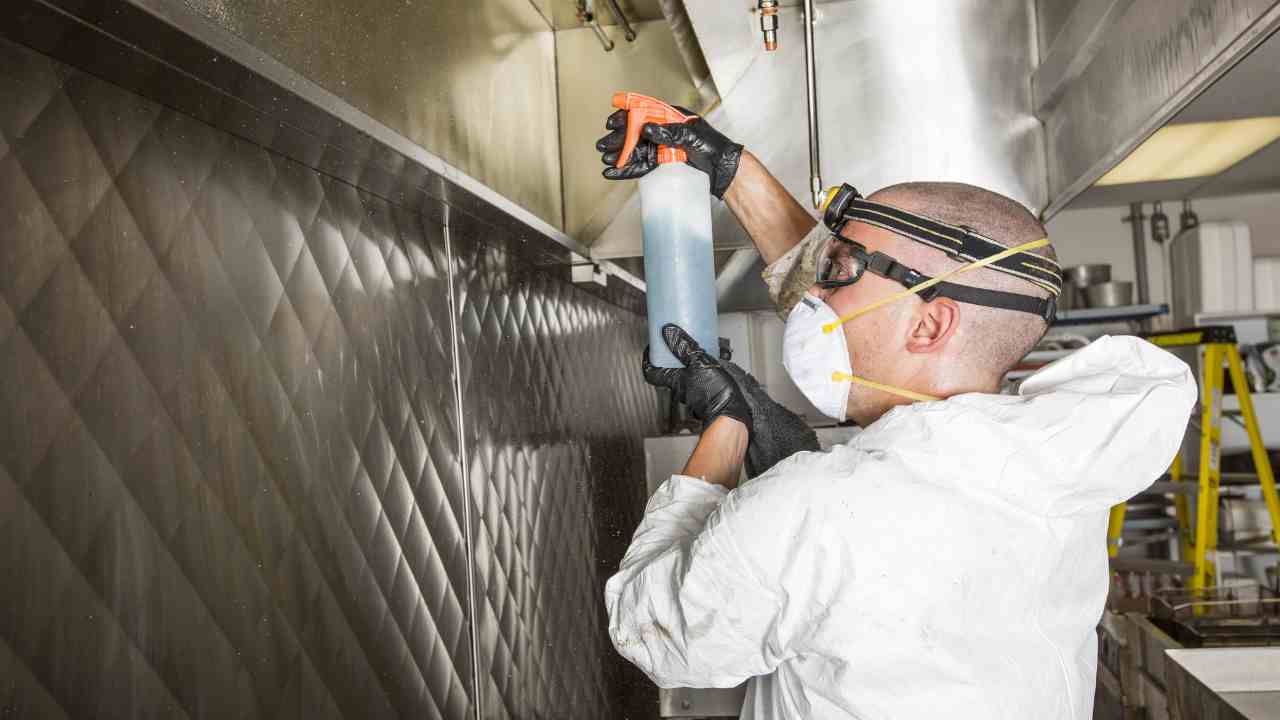Prudent Practices Of Kitchen Exhaust Cleaning Process

Kitchen exhaust cleaning is an essential process that ensures the safety and efficiency of commercial kitchens. Neglecting this crucial task can lead to a variety of issues, including fire hazards, health risks, and decreased ventilation performance. In this article, we will explore the prudent practices of kitchen exhaust cleaning and the importance of maintaining a clean and well-functioning kitchen ventilation system.
Ontario-wide Kitchen Exhaust and Hood Cleaning – Best prices and service guaranteed.
The Importance of Kitchen Exhaust Cleaning
A commercial kitchen generates a significant amount of grease, smoke, and other airborne contaminants during cooking. These substances are captured by the kitchen exhaust system, which includes the hood, ductwork, and exhaust fan. Over time, these components can become coated with a thick layer of grease, posing serious risks to the kitchen and its occupants.
One of the primary reasons for regular kitchen exhaust cleaning is fire prevention. Grease buildup in the exhaust system is highly flammable and can ignite with a single spark. According to the National Fire Protection Association (NFPA), nearly one-third of all restaurant fires are caused by grease buildup in the kitchen exhaust system. These fires can result in significant property damage, injuries, and even loss of life.
Another critical reason for kitchen exhaust cleaning is to maintain a healthy indoor environment. The accumulation of grease and other contaminants in the exhaust system can lead to poor air quality, which can have adverse effects on the health of kitchen staff and customers. Breathing in contaminated air can cause respiratory issues, allergies, and other health problems.
Ontario-wide Kitchen Exhaust and Hood Cleaning – Best prices and service guaranteed.
Furthermore, a clean and well-maintained kitchen exhaust system ensures optimal ventilation performance. When the exhaust system is clogged with grease, it hampers the airflow, reducing the effectiveness of the ventilation system. This can result in excessive heat, smoke, and odors in the kitchen, making it an uncomfortable and unsafe working environment.
Prudent Practices for Kitchen Exhaust Cleaning
Now that we understand the importance of kitchen exhaust cleaning, let’s explore the prudent practices that should be followed to ensure a thorough and effective cleaning process:
1. Regular Cleaning Schedule
Establishing a regular cleaning schedule is crucial to prevent grease buildup in the kitchen exhaust system. The frequency of cleaning depends on the volume of cooking and the type of food being prepared. High-volume kitchens, such as those in restaurants and hotels, may require monthly or quarterly cleanings, while low-volume kitchens may only need cleaning every six months to a year.
Ontario-wide Kitchen Exhaust and Hood Cleaning – Best prices and service guaranteed.
2. Compliance with Industry Standards
It is essential to comply with industry standards and regulations when performing kitchen exhaust cleaning. The NFPA Standard 96 provides guidelines for the design, installation, operation, inspection, and maintenance of commercial kitchen ventilation systems. Following these standards ensures that the cleaning process is thorough and meets the necessary safety requirements.
3. Certified and Trained Professionals
Hiring certified and trained professionals for kitchen exhaust cleaning is crucial. These professionals have the knowledge, skills, and equipment to perform a thorough cleaning while adhering to safety standards. They are familiar with the intricacies of the exhaust system and can identify potential issues that may require repairs or maintenance.
Ontario-wide Kitchen Exhaust and Hood Cleaning – Best prices and service guaranteed.
4. Comprehensive Cleaning Process
A comprehensive cleaning process involves cleaning not only the visible parts of the exhaust system, such as the hood and filters but also the hidden components, including the ductwork and exhaust fan. Neglecting any part of the system can lead to incomplete cleaning and potential fire hazards. The cleaning process should include the removal of grease, debris, and other contaminants from all components of the exhaust system.
5. Use of Proper Cleaning Techniques and Tools
Using the right cleaning techniques and tools is essential for effective kitchen exhaust cleaning. High-pressure steam cleaning is often used to remove stubborn grease buildup, while specialized brushes and scrapers are used to clean hard-to-reach areas. It is important to avoid using harsh chemicals that can damage the exhaust system or leave behind toxic residues.
Ontario-wide Kitchen Exhaust and Hood Cleaning – Best prices and service guaranteed.
6. Inspection and Maintenance
Regular inspection and maintenance of the kitchen exhaust system are crucial to identify any issues or potential problems. This includes checking for damaged or worn-out components, loose connections, and signs of grease buildup. Timely repairs and maintenance can prevent costly repairs and ensure the longevity of the exhaust system.
Case Studies and Statistics
Ontario-wide Kitchen Exhaust and Hood Cleaning – Best prices and service guaranteed.
Let’s take a look at some case studies and statistics that highlight the importance of kitchen exhaust cleaning:
Case Study 1: Restaurant Fire
In 2018, a restaurant in a busy commercial district experienced a devastating fire that started in the kitchen. The fire was caused by a grease buildup in the kitchen exhaust system, which ignited when a spark from the cooking equipment came into contact with the highly flammable grease. The fire resulted in significant property damage and the temporary closure of the restaurant.
Case Study 2: Health Inspection Violations
A health inspection conducted in a popular restaurant revealed a severe violation related to the cleanliness of the kitchen exhaust system. The inspection report highlighted excessive grease buildup in the hood, ductwork, and exhaust fan, posing a health risk to the kitchen staff and customers. The restaurant was fined, and its reputation suffered a significant blow.
Statistics: Restaurant Fires
- According to the NFPA, an estimated 7,410 restaurant fires occur annually in the United States.
- Grease and cooking-related fires account for 61% of all restaurant fires.
- Failure to clean the kitchen exhaust system is the leading cause of restaurant fires.
- Restaurant fires result in an average of $246 million in property damage each year.
Ontario-wide Kitchen Exhaust and Hood Cleaning – Best prices and service guaranteed.
Kitchen exhaust cleaning is a critical process that ensures the safety, efficiency, and longevity of commercial kitchens. Neglecting this process can lead to fire hazards, health risks, and decreased ventilation performance. By following prudent practices, such as establishing a regular cleaning schedule, complying with industry standards, hiring certified professionals, and performing a comprehensive cleaning process, commercial kitchens can maintain a clean and well-functioning kitchen exhaust system. Regular inspection and maintenance are also essential to identify any issues and prevent costly repairs. By prioritizing kitchen exhaust cleaning, commercial kitchens can create a safe and healthy environment for their staff and customers while minimizing the risk of fire and other hazards.
Learn more about “Signs That Indicate You Need To Clean Your Kitchen Exhaust” right here.
Frequently asked questions about Prudent Practices Of Kitchen Exhaust Cleaning Process

Why is it important to clean my kitchen exhaust hood regularly? 🧼
Regular cleaning of your kitchen exhaust hood is crucial for several reasons! 🏆 First and foremost, it helps to maintain a healthy and safe environment in your kitchen. Over time, grease, oil, and other residues build up in the hood and its ductwork, creating a potential fire hazard. Cleaning prevents the risk of dangerous kitchen fires, keeping you and your loved ones safe. 🔥 Additionally, a clean exhaust hood ensures optimal ventilation, allowing smoke, heat, and odors to be effectively removed, enhancing the overall air quality in your home. Plus, regular cleaning improves the hood’s efficiency, saving energy and reducing utility costs. 💰
How often should I clean my kitchen exhaust hood? 📅
The cleaning frequency depends on how frequently you use your kitchen and the type of cooking you do. As a general guideline, residential kitchen exhaust hoods should be cleaned at least once every three months. 🗓️ However, if you have a busy kitchen with heavy cooking activities, it’s recommended to clean it once a month. Commercial kitchens, like those in restaurants, should have their exhaust hoods cleaned more frequently, ranging from weekly to monthly, depending on the volume of cooking. 🍔🍕 Regular cleaning not only ensures safety and efficiency but also extends the lifespan of your exhaust hood.
Can I clean my kitchen exhaust hood by myself, or should I hire a professional? 🧽
While basic maintenance like cleaning the hood’s surface and filters can be done by homeowners, a professional kitchen exhaust hood cleaning is highly recommended for thorough and effective results. 🧹 Trained technicians have the expertise, specialized equipment, and eco-friendly cleaning agents to tackle stubborn grease and grime buildup that may be hidden inside the ductwork. They follow industry standards to ensure your exhaust hood is completely grease-free, maximizing its performance and minimizing fire hazards. Hiring professionals also saves you time and effort, giving you peace of mind knowing the job is done right. 😊
What should I expect during a professional kitchen exhaust hood cleaning service?
When you schedule a professional kitchen exhaust hood cleaning service, expect a comprehensive and thorough process! 🔄 The technician will start by inspecting your exhaust system to identify any issues or areas that need special attention. They will then protect your kitchen surfaces and equipment before proceeding with the cleaning. Using specialized tools and degreasing agents, the technician will clean the hood, filters, ductwork, and exhaust fan. After the cleaning, they will reassemble the components, ensuring everything is back in working order. 🛠️ The technician may also provide recommendations for regular maintenance and cleaning intervals to keep your kitchen exhaust hood in top-notch condition.
How can I tell if my kitchen exhaust hood needs cleaning or maintenance? 🕵️
Several signs indicate that your kitchen exhaust hood needs attention. 🚨 If you notice visible grease buildup on the hood’s surface or filters, it’s time for a cleaning. Another telltale sign is persistent odors in your kitchen even after cooking. 🤢 Reduced airflow and noisy fan operation are also indicators that your exhaust hood may be clogged with grease and debris. If you see smoke or steam lingering in your kitchen, instead of being effectively vented outside, that’s a red flag too. 🚩 If you encounter any of these issues, don’t delay—schedule a cleaning service promptly to maintain a safe, efficient, and pleasant cooking environment. 🌟
- hood cleaning
- kitchen exhaust cleaning
- Prudent Practices Of Kitchen Exhaust Cleaning Process
- restaurant hood cleaning







